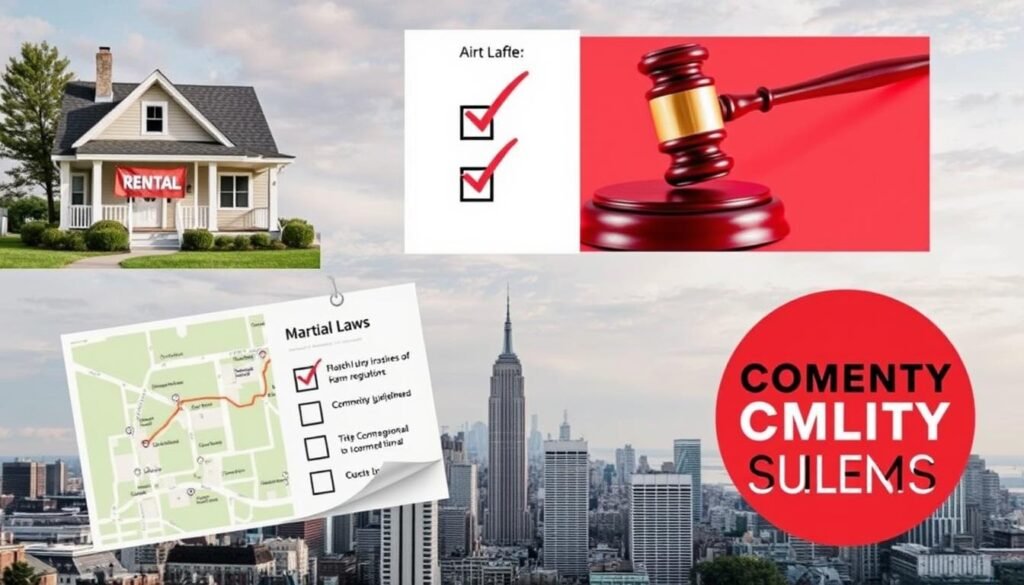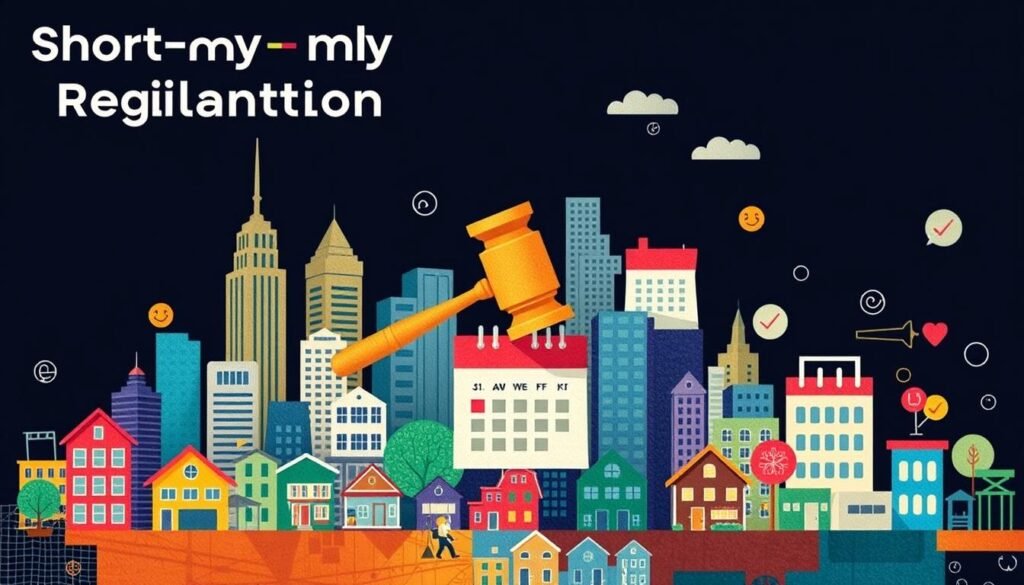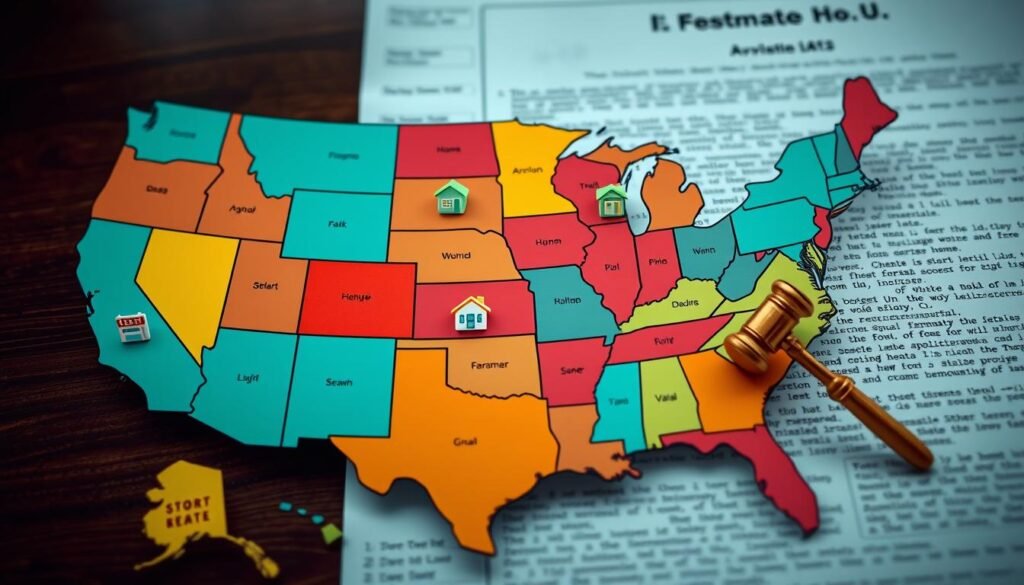In the ever-evolving landscape of the sharing economy, the legality of short-term rentals has become a pressing concern for Airbnb hosts. As the popularity of platforms like Airbnb continues to grow, navigating the complex web of regulations, taxes, and legal requirements has become a significant challenge for those looking to offer their properties for short-term stays. This comprehensive guide delves into the legal intricacies surrounding short-term rental regulations, equipping Airbnb hosts with the knowledge and strategies necessary to ensure compliance and mitigate potential legal risks.
Key Takeaways
- Understand the legal landscape surrounding short-term rentals, including federal, state, and local regulations.
- Explore Airbnb’s role in the legal framework and the resources it offers to hosts for compliance.
- Identify common legal challenges faced by Airbnb hosts, such as zoning laws, taxes, and neighbor complaints.
- Discover strategies for navigating tax obligations and building positive relationships with local governments.
- Stay informed on emerging trends and predictions in the future of short-term rental regulations.
Understanding Short-Term Rentals
In the dynamic world of vacation rentals, short-term rentals have emerged as a popular alternative to traditional long-term leases. These rentals, often facilitated by platforms like Airbnb and VRBO, offer travelers the flexibility to experience a destination like a local, while providing homeowners an opportunity to generate additional income.
Definition of Short-Term Rentals
Short-term rentals refer to the temporary occupation of a residential property, typically for periods ranging from a single night to a few weeks. This distinct arrangement differs from conventional long-term leases, which typically span several months or years. The rise of vacation rental laws and Airbnb host compliance requirements has brought increased scrutiny to this evolving sector.
Common Platforms Used
- Airbnb: One of the leading short-term rental platforms, Airbnb connects hosts with guests seeking unique accommodations.
- VRBO (Vacation Rental By Owner): A popular platform that enables homeowners to list and rent their properties directly to travelers.
- HomeAway: A subsidiary of Expedia, HomeAway offers a diverse selection of vacation rental properties worldwide.
Key Differences from Traditional Rentals
While short-term rentals share some similarities with traditional long-term leases, there are several key differences that set them apart. These include:
- Occupancy Duration: Short-term rentals typically involve stays of a few days or weeks, compared to the longer-term commitments associated with conventional rentals.
- Regulatory Landscape: The rise of vacation rental laws and Airbnb host compliance requirements has introduced a complex regulatory framework that short-term rental providers must navigate.
- Guest Turnover: Short-term rentals often experience a higher frequency of guest turnover, necessitating efficient cleaning and maintenance protocols.
As the vacation rental market continues to evolve, understanding the unique characteristics of short-term rentals and the associated legal considerations is essential for Airbnb hosts and other providers to ensure compliance and success in this dynamic industry.
The Regulatory Landscape
The world of short-term rentals is a complex web of regulations, with laws and ordinances at the federal, state, and local levels impacting Airbnb hosts. Understanding this multi-layered regulatory environment is crucial for anyone looking to navigate the world of short-term rentals successfully.
Federal Regulations Impacting Rentals
At the federal level, short-term rental hosts must be aware of regulations governing issues such as fair housing, taxation, and consumer protection. These rules can vary widely depending on the specific nature of the rental and the host’s business model.
State-Level Laws to Consider
- Many states have enacted their own laws and regulations regarding short-term rentals, including restrictions on zoning restrictions for short-term rentals.
- Hosts must familiarize themselves with state-specific requirements for licensing, taxation, and reporting.
- Some states have also implemented regulations aimed at addressing the impact of short-term rentals on local housing markets and neighborhoods.
Local Ordinances and Homeowners Associations
Perhaps the most significant regulatory hurdles for Airbnb hosts come at the local level. Local ordinances impacting short-term rentals can include zoning restrictions, registration and permitting requirements, and even outright bans in certain areas. Homeowners associations may also have their own rules and regulations governing short-term rentals within their communities.
Navigating this complex regulatory landscape is crucial for Airbnb hosts who want to avoid legal pitfalls and ensure compliance with all applicable laws and ordinances. By staying informed and proactively addressing regulatory concerns, hosts can maximize their chances of success in the short-term rental market.

Airbnb's Role in the Legal Framework
As the leading platform for short-term rentals, Airbnb plays a crucial role in helping its hosts navigate the complex legal landscape. The company has taken several steps to address the legal challenges faced by Airbnb hosts and promote compliance with local regulations.
Airbnb's Policies on Compliance
Airbnb has established clear policies and guidelines to assist its hosts in understanding and adhering to the legal requirements in their respective locations. The platform provides detailed information on zoning laws, licensing, taxes, and other compliance-related issues, empowering hosts to make informed decisions and operate within the bounds of the law.
Resources Offered by Airbnb
- Comprehensive host guides and tutorials covering legal compliance
- Partnerships with legal experts and tax professionals to offer specialized advice
- Dedicated support channels for hosts to address specific legal questions and concerns
- Proactive communication on changes in local regulations and their implications
Challenges for Hosts on Airbnb
Despite Airbnb’s efforts, hosts may still face significant challenges in maintaining legal compliance. The ever-evolving regulatory landscape, with a patchwork of laws and ordinances across different jurisdictions, can create confusion and uncertainty for Airbnb hosts. Additionally, some hosts may struggle to stay informed about the latest legal updates or may encounter difficulties in navigating the complex compliance requirements.
“Navigating the legal landscape as an Airbnb host can be a daunting task, but the platform’s resources and support have been invaluable in helping me stay compliant with local regulations.”
Airbnb’s commitment to supporting its hosts in legal compliance is a crucial aspect of the company’s role within the short-term rental industry. By providing comprehensive resources and guidance, Airbnb aims to empower its hosts to operate their businesses successfully while adhering to the evolving legal framework.

Common Legal Challenges for Hosts
As the short-term rental industry continues to grow, Airbnb hosts often face a variety of legal challenges that can make operating a vacation rental property a complex endeavor. From navigating zoning laws and permitting requirements to managing tax obligations and addressing neighbor complaints, hosts must be well-versed in the legal landscape to ensure compliance and mitigate risks.
Zoning Laws and Permitting Issues
One of the most common legal obstacles for Airbnb hosts is complying with local zoning regulations. Many municipalities have specific laws governing the use of residential properties for short-term rentals, including restrictions on the number of nights a property can be rented, the number of guests allowed, and the percentage of the home that can be used for commercial purposes. Hosts must research and obtain the necessary permits before offering their property on the Airbnb platform to avoid potential fines or even the shutdown of their rental business.
Taxes and Licensing Requirements
In addition to zoning laws, Airbnb hosts must also navigate the complex web of tax obligations and licensing requirements. Depending on the jurisdiction, short-term rental hosts may be required to pay a variety of taxes, including sales tax, occupancy tax, and income tax. Failure to properly register and remit these taxes can result in significant penalties. Furthermore, many cities and states mandate that Airbnb hosts obtain specific licenses or permits, such as a business license or a vacation rental permit, to legally operate their short-term rental.
Neighbor Complaints and Nuisance Claims
The presence of a short-term rental property in a residential neighborhood can also lead to complaints from nearby residents. Noise, parking issues, and concerns about the impact on property values are common grievances that can result in nuisance claims or other legal actions against the host. Airbnb hosts must be proactive in addressing these concerns and maintaining positive relationships with their neighbors to avoid potential legal disputes.
By understanding and addressing these common legal challenges, Airbnb hosts can better navigate the complex regulatory landscape and successfully operate their short-term rental business while minimizing the risk of legal complications.

Impact of Local Government Policies
As the short-term rental industry continues to evolve, local governments have taken a more active role in regulating the vacation rental laws and local ordinances impacting short-term rentals. This shifting regulatory landscape presents both opportunities and challenges for Airbnb hosts.
Trends in Regulation Across Major Cities
Cities like New York, San Francisco, and Los Angeles have implemented stricter rules and guidelines for short-term rentals, including caps on the number of nights a property can be rented, mandatory registration and licensing, and zoning restrictions. On the other hand, cities like Denver and Nashville have taken a more lenient approach, allowing hosts greater flexibility in how they operate their vacation rentals.
Case Studies of Successful Compliance
Some Airbnb hosts have navigated the complex legal landscape by proactively educating themselves on the local regulations and working closely with their local governments. For example, a host in Seattle was able to secure a special permit to operate their vacation rental after demonstrating compliance with city ordinances and building positive relationships with their neighbors.
Examples of Stricter Regulations
| City | Key Regulations |
|---|---|
| New York City | Limits short-term rentals to 30 days or less, requires hosts to register with the city, and bans certain types of short-term rentals in multifamily buildings. |
| San Francisco | Requires hosts to obtain a business license, limits short-term rentals to 90 days per year, and prohibits rentals in certain neighborhoods. |
| Los Angeles | Imposes a 120-day annual cap on short-term rentals, mandates a city-issued license, and restricts rentals in certain residential zones. |
As the local ordinances impacting short-term rentals and vacation rental laws continue to evolve, Airbnb hosts must stay vigilant and proactive in understanding and complying with the regulations in their respective markets.

Liability and Insurance Concerns
As an Airbnb host, understanding the legal liabilities you may face and ensuring adequate insurance coverage is crucial. Short-term rental platforms like Airbnb bring unique risks that traditional landlords may not encounter, requiring hosts to navigate a complex landscape of compliance and liability protection.
Understanding Host Liability
Airbnb hosts can be held liable for a variety of issues, from guest injuries to property damage to compliance violations. Hosts may face legal challenges related to zoning laws, licensing requirements, and even neighbor complaints. Properly managing these risks is essential for Airbnb host compliance and protecting your investment.
Importance of Adequate Insurance
Securing the right insurance coverage is a critical step for Airbnb hosts. Standard homeowner’s or renter’s insurance may not provide sufficient protection for short-term rentals. Specialized Airbnb host insurance policies can cover liabilities, property damage, and other unique risks associated with hosting guests in your home.
Recommended Insurance Providers
- Proper Insurance: Offers comprehensive coverage for Airbnb and vacation rental hosts, including liability, property damage, and more.
- Slice: Provides on-demand, short-term insurance policies tailored to the needs of Airbnb and other vacation rental hosts.
- Safely: Specializes in insurance solutions for the short-term rental market, with a focus on protecting hosts from legal liabilities.
By understanding the potential legal liabilities of Airbnb hosts and investing in the right insurance coverage, you can confidently navigate the world of short-term rentals and protect your business and your home.

Tenants' Rights and Short-Term Rentals
When it comes to short-term rentals, the legal landscape can be particularly complex for Airbnb hosts who are also tenants. Navigating the intersection of tenants’ rights and the challenges of operating a short-term rental is a critical consideration for any aspiring host.
Implications for Lease Agreements
Subletting or renting out a leased property as a short-term rental can often violate the terms of a standard lease agreement. Tenants must carefully review their lease contracts to ensure they are not breaching any clauses that prohibit or restrict the use of the property for commercial or short-term rental purposes.
Legal Protections for Tenants
- Many jurisdictions have laws in place to protect tenants from landlord retaliation or eviction due to their participation in short-term rentals.
- Tenants may have the right to challenge any attempt to terminate their lease or evict them based solely on their short-term rental activities.
- Understanding local tenant protection laws is crucial for Airbnb hosts who are also renters.
Eviction Risks for Hosts
However, the legal risks extend both ways. Airbnb hosts who are tenants can face eviction if their short-term rental activities violate their lease agreement or local regulations. Hosts must be vigilant in ensuring they comply with all applicable laws and regulations to avoid potential eviction.

The delicate balance between tenants’ rights and the challenges of Airbnb hosting underscores the importance for Airbnb hosts to thoroughly understand the legal implications of their activities, both for their own protection and to avoid potential conflicts with their landlords.
State-Specific Regulations to Watch
As the popularity of vacation rentals continues to surge, it’s crucial for Airbnb hosts to stay informed about the evolving regulatory landscape. Three states known for their vibrant tourism industries and strong Airbnb presence are California, New York, and Florida, each with its own unique set of vacation rental laws and zoning restrictions for short-term rentals.
California's Short-Term Rental Laws
California has been at the forefront of the short-term rental debate, with many municipalities implementing strict regulations. In cities like San Francisco and Los Angeles, hosts must obtain a permit, comply with local zoning restrictions for short-term rentals, and pay applicable taxes. Failure to do so can result in hefty fines or even the suspension of rental activities.
New York's STR Legislation
New York State has also grappled with the rise of short-term rentals, particularly in popular tourist destinations like New York City. The state has introduced legislation that requires hosts to register their properties and imposes limitations on the number of days a property can be rented out. Navigating these vacation rental laws is crucial for Airbnb hosts in the Empire State.
Florida's Emerging Regulations
Florida, known for its vibrant tourism industry, has also been exploring ways to regulate the short-term rental market. Some cities, such as Miami Beach, have implemented measures like occupancy limits and registration requirements for hosts. As the demand for vacation rentals continues to grow, Florida’s regulatory landscape is likely to evolve further, requiring Airbnb hosts to stay vigilant and adaptable.

Staying informed about the nuances of state-specific vacation rental laws and zoning restrictions for short-term rentals is crucial for Airbnb hosts looking to navigate the legal landscape successfully. By understanding the unique challenges and opportunities in key tourism-driven states, hosts can better position themselves for long-term success in the short-term rental market.
Navigating Tax Obligations
As an Airbnb host, managing tax obligations is a crucial aspect of running a successful short-term rental business. From income reporting to understanding local taxes and fees, it’s essential for hosts to stay compliant and informed to maximize their earnings.
Income Reporting for Airbnb Hosts
All income earned through Airbnb must be reported as taxable income. Hosts should maintain detailed records of their rental earnings, expenses, and any applicable deductions. It’s recommended to consult with a tax professional to ensure proper reporting and compliance with short-term rental taxes.
Local Taxes and Fees Overview
In addition to federal income taxes, Airbnb hosts may be subject to various local taxes and fees, such as occupancy taxes, tourism taxes, and sales taxes. These can vary significantly based on the host’s location, so it’s important to research and understand the specific requirements in their area to remain Airbnb host compliant.
Deductions and Tax Strategies
- Deductible expenses: Hosts can potentially write off a portion of their mortgage, utilities, insurance, and other relevant costs associated with operating their short-term rental.
- Home office deduction: If a dedicated space in the home is used solely for Airbnb operations, it may qualify for a home office deduction.
- Depreciation: Hosts can claim depreciation on the rental property and furnishings, which can provide significant tax savings over time.
By understanding and effectively managing their tax obligations, Airbnb hosts can optimize their earnings and stay compliant with all applicable laws and regulations. Consulting with a tax professional can help ensure hosts are taking advantage of all available deductions and strategies to minimize their tax burden.

Best Practices for Airbnb Hosts
As an Airbnb host, maintaining legal compliance and successful operations requires a proactive approach. One of the key aspects is staying informed on the ever-evolving local laws that govern short-term rentals. Hosts must vigilantly monitor changes in zoning regulations, licensing requirements, and tax obligations to ensure they are operating within the boundaries of the law.
Staying Informed on Local Laws
Airbnb host compliance is not a one-time task but an ongoing commitment. Hosts should regularly check their city’s or county’s website for updates on short-term rental policies, attend local government meetings, and engage with industry associations to stay ahead of the curve. Proactive communication with authorities can help navigate challenges for Airbnb hosts and avoid potential legal issues.
Building Positive Neighborhood Relationships
Successful Airbnb hosts understand the importance of fostering positive relationships with their neighbors. This can involve being considerate of noise levels, ensuring guests respect the community, and addressing any concerns promptly. By building trust and open communication, hosts can mitigate the risk of neighbor complaints and nuisance claims.
Effective Communication with Guests
Clear and transparent communication with guests is crucial for maintaining legal compliance and delivering a positive experience. Hosts should provide guests with detailed information about local regulations, house rules, and any restrictions or expectations upfront. This helps set the right expectations and ensures guests comply with the rules, reducing the likelihood of issues that could lead to legal challenges.
By adopting these best practices, Airbnb hosts can navigate the legal landscape with confidence, build strong relationships within their communities, and enhance the overall success of their short-term rental operations.

| Best Practices for Airbnb Hosts | Description |
|---|---|
| Staying Informed on Local Laws | Regularly monitoring changes in regulations, attending local government meetings, and engaging with industry associations to stay compliant. |
| Building Positive Neighborhood Relationships | Fostering trust and open communication with neighbors to mitigate the risk of complaints and nuisance claims. |
| Effective Communication with Guests | Providing guests with clear information about local regulations, house rules, and expectations to ensure compliance. |
Resources for Legal Guidance
As Airbnb hosts navigate the complex world of short-term rental regulations, access to reliable legal resources is crucial. Fortunately, there are several professional associations, online platforms, and local services that can provide expert guidance on navigating the Airbnb legal issues you may face.
Professional Associations and Organizations
- The American Hotel & Lodging Association (AHLA) offers a wealth of information and advocacy resources for short-term rental hosts.
- The Vacation Rental Management Association (VRMA) provides legal support and compliance assistance to members.
- Local real estate or landlord associations may also offer guidance on short-term rental regulations in your area.
Online Legal Resources
In addition to professional organizations, there are numerous online platforms that host valuable legal resources for Airbnb hosts:
- Airbnb’s Responsible Hosting page provides an overview of legal requirements and compliance best practices.
- The Short-Term Rental Advocacy Center offers a comprehensive library of regulations, policies, and compliance guides.
- Legal zoom and other online legal service providers can connect you with attorneys specializing in Airbnb legal issues.
Local Legal Aid and Consultation Services
For more personalized guidance, consider reaching out to local legal aid organizations or consulting with a real estate attorney in your area. They can provide tailored advice on navigating the specific short-term rental regulations in your community.

By leveraging these valuable resources, Airbnb hosts can stay informed, compliant, and empowered to operate their short-term rental businesses successfully.
Engaging with Local Governments
As Airbnb hosts navigate the complex regulatory landscape surrounding short-term rentals, engaging with local governments becomes increasingly crucial. By advocating for their interests and communicating effectively, hosts can work to influence local policies and address the challenges they face.
Importance of Advocacy and Communication
Local ordinances can have a significant impact on the operations of short-term rental hosts, and it is essential for them to stay informed and actively participate in the policy-making process. Airbnb hosts should attend city council meetings, participate in public hearings, and reach out to local officials to voice their concerns and perspectives. Effective communication, backed by data and thoughtful arguments, can help shape regulations that balance the needs of the community and the rights of property owners.
Strategies for Influencing Local Policy
- Build relationships with local officials and policymakers to establish trust and open lines of communication.
- Collaborate with other Airbnb hosts and short-term rental advocates to present a united front and amplify your collective voice.
- Participate in public comment periods and hearings to provide input on proposed regulations and ordinances.
- Leverage media and social media to raise awareness and garner public support for your cause.
- Propose alternative solutions or compromise measures that address the concerns of local governments while protecting the interests of short-term rental hosts.
Building Coalitions with Other Hosts
Airbnb hosts can significantly increase their influence by partnering with other short-term rental providers and forming coalitions. By joining forces, hosts can pool their resources, share best practices, and collectively advocate for more favorable local policies. These coalitions can also facilitate the sharing of legal and regulatory expertise, helping individual hosts navigate the complexities of local ordinances impacting short-term rentals and address the challenges for Airbnb hosts.
| Advocacy Strategies | Potential Benefits |
|---|---|
| Attending City Council Meetings | Opportunity to voice concerns and propose solutions directly to local policymakers |
| Forming Host Coalitions | Increased collective influence and access to shared resources and expertise |
| Utilizing Media and Social Media | Raising public awareness and garnering support for host perspectives |
| Proposing Compromise Measures | Finding mutually beneficial solutions that address the needs of both hosts and local governments |
By engaging proactively with local governments and building strategic partnerships, Airbnb hosts can navigate the complex legal landscape and work towards more favorable policies that support the growth and sustainability of the short-term rental industry.

The Future of Short-Term Rental Regulations
As the short-term rental market continues to evolve, the landscape of regulations surrounding Airbnb and similar platforms is poised for significant changes. From emerging trends to the role of technology in compliance, the future of short-term rental regulations holds both challenges and opportunities for hosts.
Emerging Trends and Predictions
Experts foresee a rise in more stringent local regulations on short-term rentals, as cities and municipalities seek to address the impact of these rentals on housing availability and community character. Trends may include stricter caps on the number of rental days, enhanced registration and licensing requirements, and increased enforcement efforts to ensure host compliance with short-term rental regulations.
The Role of Technology in Compliance
Technological advancements are expected to play a crucial role in the future of short-term rental compliance. Platforms like Airbnb may introduce enhanced tools to assist hosts in navigating the complex web of regulations, automating processes such as tax remittance and guest registration. Additionally, local governments may leverage data analytics and monitoring technology to better track and enforce compliance within their jurisdictions.
Potential Legal Challenges Ahead
- Ongoing disputes over the rights of hosts and the authority of local governments to regulate short-term rental operations.
- Challenges to the constitutionality of certain regulations, such as those that infringe on property rights or free speech.
- Evolving legal interpretations of the responsibilities and liabilities of short-term rental platforms and hosts.
As the regulatory landscape continues to shift, Airbnb hosts must remain vigilant, staying informed on the latest short-term rental regulations and engaging with local policymakers to ensure their voices are heard. By proactively addressing legal challenges and adapting to emerging trends, hosts can navigate the future of the short-term rental market with greater confidence and success.

Conclusion: Navigating Legal Challenges Successfully
As we’ve explored throughout this comprehensive guide, the legal landscape surrounding Airbnb hosting and short-term rentals is complex and ever-evolving. From navigating zoning laws and tax obligations to addressing liability concerns and tenant rights, Airbnb hosts must remain vigilant and proactive in ensuring their compliance with the myriad of regulations that govern this dynamic industry.
Recap of Key Points
To summarize the key takeaways, Airbnb hosts must stay informed on the latest federal, state, and local regulations impacting their operations, build positive relationships with their local governments and communities, and leverage the resources and support offered by Airbnb and other industry organizations. Maintaining comprehensive insurance coverage and effectively communicating with guests are also essential best practices for mitigating legal risks.
Final Thoughts on Compliance
While navigating the legal complexities of Airbnb hosting may seem daunting at times, a steadfast commitment to compliance is paramount. By embracing a culture of transparency, accountability, and continuous learning, Airbnb hosts can navigate these challenges successfully and continue to thrive in the short-term rental market. The rewards of responsible hosting extend far beyond financial gains, fostering vibrant local communities and enriching the travel experiences of guests worldwide.
Encouragement for Continued Education
As the regulatory landscape evolves, Airbnb hosts must remain vigilant and proactive in their pursuit of legal knowledge. By engaging with industry associations, monitoring legislative updates, and seeking professional legal guidance when necessary, hosts can ensure they are equipped to adapt to the changing tides and remain compliant. With dedication and a commitment to staying informed, Airbnb hosts can continue to unlock the full potential of the short-term rental industry while upholding the highest standards of legal and ethical conduct.
FAQ
What are the common legal challenges faced by Airbnb hosts?
Common legal challenges for Airbnb hosts include navigating zoning laws and permitting issues, complying with tax and licensing requirements, and addressing neighbor complaints or nuisance claims. Hosts must stay informed on evolving local regulations to ensure compliance.
How do local government policies impact short-term rentals?
Local government policies can have a significant impact on the short-term rental industry. Some cities have embraced short-term rentals, while others have implemented stricter regulations, such as zoning restrictions and permitting requirements. Hosts must closely monitor the regulatory landscape in their area.
What are the liability and insurance concerns for Airbnb hosts?
Airbnb hosts face potential liability risks, including property damage, injuries, and lawsuits. Maintaining adequate insurance coverage, such as short-term rental insurance, is crucial to protect hosts from these liabilities. Hosts should research recommended insurance providers and coverage options.
How do tenant rights affect short-term rentals?
Tenants who sublet their rented properties as short-term rentals must consider the implications for their lease agreements. Hosts who are tenants may face legal risks, such as eviction, if they violate their lease terms. Understanding tenant protections is essential for Airbnb hosts who are renting their properties.
What are the key tax obligations for Airbnb hosts?
Airbnb hosts are required to report their rental income and may be subject to local taxes and fees. Hosts should familiarize themselves with income reporting requirements, deductions, and tax strategies to optimize their tax outcomes and maintain compliance.
What are the best practices for Airbnb hosts to ensure legal compliance?
Successful Airbnb hosts stay informed on local laws, build positive relationships with their neighbors, and maintain clear communication with guests. Effective compliance strategies include regularly checking for updates on regulations, fostering community goodwill, and setting clear expectations with renters.
Where can Airbnb hosts find legal guidance and resources?
Airbnb hosts can access legal guidance and resources through professional associations, online platforms, and local legal aid services. These resources can provide expert advice on navigating the complex legal landscape of short-term rentals.
How can Airbnb hosts engage with local governments to influence short-term rental policies?
Airbnb hosts can engage with local governments through advocacy, effective communication, and collaboration with other hosts. This can involve attending city council meetings, providing feedback on proposed regulations, and forming coalitions to influence short-term rental policies in their area.



